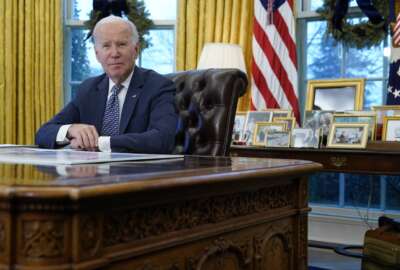
Democrats reintroduce bill to give feds 8.7% average pay raise next year
In what has become tradition in recent years, a bicameral pair of Democrats proposed a bill to give most civilian federal employees an 8.7% pay raise in 2024.
A bicameral pair of Democrats proposed a bill to give federal employees a pay raise in 2024, in what has become an annual tradition in recent years.
Rep. Gerry Connolly (D-Va.) and Sen. Brian Schatz (D-Hawaii) reintroduced the Federal Adjustment of Income Rates (FAIR) Act in the House and Senate, respectively, to give most civilian employees an 8.7% average pay raise next year.
Specifically, the bill includes a 4.7% across-the-board base pay raise, plus a 4% average locality pay increase. The legislation also includes a 4.7% raise for prevailing rate employees.
The two congressmen together have introduced similar versions of the FAIR Act in the past three Congresses, and Connolly has introduced the FAIR Act in some form every year for the last nine years.
Notably, Congress has never passed any version of the FAIR Act. Typically, the enacted pay raise for federal employees is lower than what’s included in the annual legislation.
For example, last year’s version of the FAIR Act proposed a 5.1% average pay raise, combining a 4.1% across-the-board raise, plus a 1% average locality pay increase. But for 2023, President Joe Biden enacted a 4.6% raise, composed of a 4.1% across-the-board raise and a 0.5% locality pay boost.
But within the last several years, Congress has occasionally legislated federal pay raises – in both 2019 and 2020. The process for calculating the annual federal pay raise is set in statute, but President Joe Biden has until the end of August to submit an alternative pay plan for federal employees to Congress. When the White House releases its annual budget proposal, it could give an earlier indication for what that pay plan may be.
So far, this year’s version of the FAIR Act has 18 co-sponsors.
“For years now, federal employees have risked their health and safety working on the frontlines of this pandemic,” Connolly said in a statement. “The FAIR Act is a critical step toward recognizing their contributions and providing fair and just compensation.”
“Whether inspecting our food, conducting medical research or caring for our veterans, federal workers play an important role in our everyday lives and deserve pay which reflects that,” Schatz said.
The FAIR Act has already gained support from several employee advocacy groups and federal unions, including the National Federation of Federal Employees (NFFE), the American Federation of Government Employees (AFGE), the International Association of Fire Fighters (IAFF), the National Treasury Employees Union (NTEU), the National Active and Retired Federal Employees (NARFE) Association and the American Federation of State, County and Municipal Employees (AFSCME).
NFFE National President Randy Erwin pointed to the growing wage gap between public and private sector workers, which the Federal Salary Council calculates annually. Most recently, the council reported that federal employees earned 24.09% less in wages alone than their private sector counterparts. In 2021, the pay gap by the same measurement was 22.47%.
“This pay gap leads to significant challenges in recruitment and retention within the civil service,” Erwin said in a statement. “Passing the FAIR Act would not be a pay raise for federal workers, it would simply be a pay adjustment that keeps pace with inflation so that federal employees can continue to provide for their families.”
AFGE National President Everett Kelley added that the wage gap makes it difficult to bring in new federal workers – something that the FAIR Act would help address.
“[The wage gap makes] it difficult for agencies to recruit, hire and retain top talent,” Everett said in a statement. “The 8.7% pay increase included in the FAIR Act will not only reward federal employees’ hard work and help them keep pace with inflation, but it will also help government agencies remain competitive and deliver high-quality services to the American public.”
The percentage included in the FAIR Act also corresponds with the latest 8.7% cost-of-living adjustment (COLA).
“The same economic conditions that prompted an 8.7% cost-of-living increase for retirees last year are relevant for the federal workforce as well,” NTEU National President Tony Reardon said in a statement. “The monthly food and housing bills have grown and health insurance premiums have spiked, which makes it harder for the frontline workers we represent to pay their bills and still save for retirement or college tuition.”
Copyright © 2025 Federal News Network. All rights reserved. This website is not intended for users located within the European Economic Area.
Drew Friedman is a workforce, pay and benefits reporter for Federal News Network.
Follow @dfriedmanWFED





